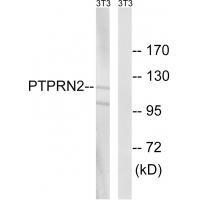
| WB | 咨询技术 | Human,Mouse,Rat |
| IF | 咨询技术 | Human,Mouse,Rat |
| IHC | 咨询技术 | Human,Mouse,Rat |
| ICC | 技术咨询 | Human,Mouse,Rat |
| FCM | 咨询技术 | Human,Mouse,Rat |
| Elisa | 咨询技术 | Human,Mouse,Rat |
| Aliases | EC 3.1.3.48; R-PTP-N2; Islet cell autoantigen-related protein; ICAAR; IAR |
| Entrez GeneID | 5799; |
| WB Predicted band size | 111kDa |
| Host/Isotype | Rabbit IgG |
| Antibody Type | Primary antibody |
| Storage | Store at 4°C short term. Aliquot and store at -20°C long term. Avoid freeze/thaw cycles. |
| Species Reactivity | Human,Mouse |
| Immunogen | Synthesized peptide derived from internal of human PTPRN2. |
| Formulation | Purified antibody in PBS with 0.05% sodium azide. |
+ +
以下是关于PTPRN2抗体的3篇参考文献的简要信息:
1. **文献名称**:*Autoantibodies to the tyrosine phosphatase PTPRN2 in type 1 diabetes*
**作者**:Wenzlau JM, et al.
**摘要**:该研究发现PTPRN2(IA-2β)是1型糖尿病中重要的自身抗原,患者血清中可检测到针对其胞内结构域的自身抗体,提示其在疾病诊断和预测中的潜在应用价值。
2. **文献名称**:*Molecular characterization of PTPRN2 (IA-2β) as a neuroendocrine autoantigen*
**作者**:Kawasaki E, et al.
**摘要**:研究揭示了PTPRN2在神经内分泌组织(如胰腺β细胞和脑组织)中的表达特性,并探讨其自身抗体在自身免疫疾病中的病理机制及临床相关性。
3. **文献名称**:*PTPRN2 regulates neurodevelopmental processes through phosphorylation-dependent signaling*
**作者**:Soman S, et al.
**摘要**:通过体外实验和小鼠模型,该文献报道了PTPRN2在神经元发育中的功能,并利用特异性抗体验证了其磷酸酶活性对突触形成和神经递质释放的调控作用。
4. **文献名称**:*Comparative analysis of IA-2β autoantibody assays in type 1 diabetes*
**作者**:Bingley PJ, et al.
**摘要**:研究比较了不同检测方法对PTPRN2(IA-2β)自身抗体的敏感性和特异性,强调其在1型糖尿病筛查中的重要性,并提出标准化检测流程的建议。
以上文献均围绕PTPRN2抗体的生物学功能、自身免疫疾病关联及临床应用展开,具体研究内容可根据需求进一步查阅原文。
The protein tyrosine phosphatase receptor type N2 (PTPRN2), also known as IA-2β, is a transmembrane glycoprotein belonging to the receptor-like protein tyrosine phosphatase family. Primarily expressed in neuroendocrine tissues, PTPRN2 plays a role in regulating secretory granule trafficking, hormone biosynthesis, and neuronal signaling. It is closely associated with insulin secretion in pancreatic β-cells, making it a research focus in diabetes studies, particularly type 1 diabetes (T1D), where autoantibodies against PTPRN2 are considered predictive biomarkers. Additionally, PTPRN2 has been implicated in neurological disorders and cancers, though its exact mechanisms remain unclear.
PTPRN2 antibodies are essential tools for investigating its expression, localization, and function. These antibodies are commonly used in techniques like Western blotting, immunohistochemistry, and immunofluorescence to study protein levels in tissues or cell lines. Due to structural similarities with other PTP family members, generating specific antibodies requires careful epitope selection and validation. Challenges include cross-reactivity and detecting splice variants. Recent studies also explore PTPRN2's interaction partners and post-translational modifications, aiding the understanding of its role in disease pathways. Ongoing research aims to clarify its therapeutic potential in metabolic and neurodegenerative conditions.
×